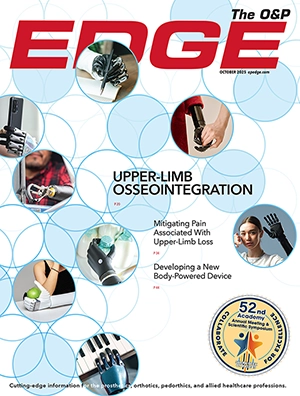
Brown measures the mental effort of a study participant as they perform simple tasks using a prosthetic hand.
Photograph courtesy of Will Kirk/Johns Hopkins University.
Researchers from Johns Hopkins University and Drexel University used neuroimaging to investigate whether providing an artificial sense of touch through haptic feedback would help people who use prosthetic hands expend less mental effort while carrying out tasks. Using functional near infrared spectroscopy (fNIRS), the research team measured the mental effort of study participants as they performed simple tasks using a prosthetic hand. The researchers found that the discrimination accuracy and mental effort were optimal with the natural hand, followed by the prosthesis featuring haptic feedback, and then the traditional prosthesis, particularly for objects whose stiffness were difficult to differentiate.
“Studies have shown that adding haptics to prosthetic devices does have benefits, in that sensory information helps the user perform tasks better,” said senior author Jeremy D. Brown, PhD, an assistant professor of mechanical engineering at Johns Hopkins University. “But what hasn’t been clear is how haptic feedback affects cognitive processes. Our study provides strong evidence that haptic feedback is beneficial from both a cognitive and task performance perspective.”
In the study, participants were asked to use a prosthesis to squeeze three blocks that looked identical but were of varying degrees of stiffness, and to identify the stiffest one. They performed the task using their intact hands, using standard prostheses, and with prostheses that provided feedback of grip force through vibrations.
During each task, the researchers measured the participants’ mental effort with fNIRS, which monitored brain activity. Participants wore headgear that measured the time-varying nature of mental effort through changes in blood oxygenation levels in the prefrontal cortex, the part of the brain involved in decision making, planning, and other behavior; the more cognitively demanding a task, the more oxygen is pumped toward the prefrontal cortex.
The researchers say that the results demonstrate the potential value of haptic sensory feedback in prostheses, especially if future studies confirm that minimizing cognitive load will maximize usability for prosthetic devices. Brown says future work for his group will focus on applying this method to more complex tasks and validating the findings.
The study, “Neurophysiological Evaluation of Haptic Feedback for Myoelectric Prostheses,” was published in IEEE Transactions on Human Machine Systems.
Editor’s note: This story was adapted from materials provided by Johns Hopkins University.



